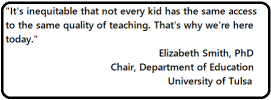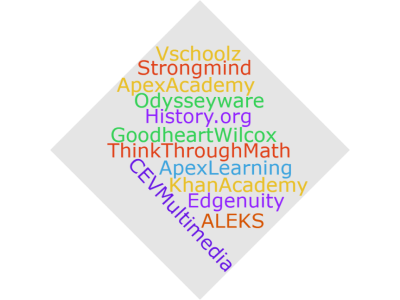With school starting, districts across the country are scrambling to find teachers for their classrooms. Yesterday, educators and policymakers gathered in Tulsa, Oklahoma to attend the Oklahoma Teacher Pipeline Summit to discuss long-term solutions to the teacher shortage. Some of the policy-based solutions that were discussed include:

- State-funded loan forgiveness, scholarships or signing bonuses for university-prepared teachers who commit to working in a public school;
- State funded paid student teacher internships;
- University-created courses to prepare future educators for subject specific knowledge (e.g., the Tulsa University is creating a STEM minor for future teachers), pedagogical knowledge, and skills educators need to support today’s students, including courses in childhood trauma.
An interim legislative study on policy solutions to address teacher shortages is anticipated.
The problem of how to find qualified teachers and how to keep them working in schools is not unique to Oklahoma. Though not optimal, a practical, short-term solution that many districts turn to are online courses. As one rural Texas principal said, “We’re having to rely on online courses more heavily than ever before. High school math teachers are hard to come by in small Texas towns. So, smaller districts like ours are using self-paced online courses when we can’t find a teacher for the course. What’s scary is that we don’t really know how good the courses are.”
Students can’t learn what they’re not taught. A material’s alignment to state standards becomes even more crucial when there’s not a certified teacher in the classroom to act as a safety net for a material’s deficits. In such cases, students have to rely exclusively on the online course for the knowledge and skills he/she needs to master the state tests. If the material is not well aligned, the district is setting the student up to fail.
Learning List gives districts peace of mind that the materials they are using will teach their students what they need to know to be successful. Our detailed alignment reports show specifically where the material (e.g., specific page numbers, lesson titles) is aligned to each standard and which standards the material is not aligned to at all. If a material is not aligned to 100% of the state’s standards for a grade and subject, our Fill-in-the-Gap™ tool recommends additional materials that fill in the gap to ensure that students are getting materials that teach 100 percent of the state’s standards. These may be other comprehensive or supplemental products; they may be publisher-produced materials or free open educational resources we have reviewed.

Beyond the alignment, our editorial reviews asses each product’s instructional quality, including the rigor, student engagement, adaptions for special student populations and ease of use. We also test which devices and operating systems each material works on and does not. Online materials not only differ in their alignment to standards, their instructional quality and design vary significantly. Some products are text heavy, requiring students to read extensively; others provide text features and videos to support student learning of key concepts. Some products require students to work through long segments of instruction before activities or checks for understanding are provided. Others chunk learning in manageable segments with regular checks for understanding and consistently embedded activities. Some provide supports to help all learners access and understand the content; other do not. And, some online products are device agnostic while others only work on specific devices.
With reviews for over 3000 of the most popular materials, Learning List has reviewed hundreds of online, self-paced courses aligned to most states’ English and Math standards. For Texas districts, we have reviewed online courses in all four core subjects. Contact us for access to reviews of online courses that can help your district support inexperienced teachers or fill in where teachers are not available.
2 thoughts on “Teacher Shortages”
Comments are closed.